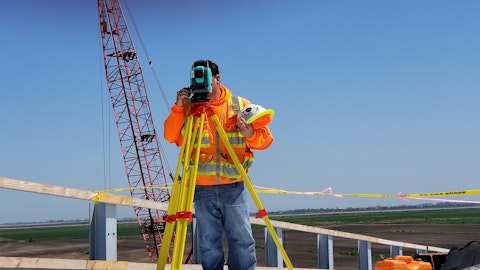Joe Gomes: Great. And then one more, if I may — you mentioned that you completed all the contracts in Central Texas in the fourth quarter?
Travis Boone: No. We haven’t completed them yet. No, yes, those contracts do kind of continue most are being worked in the first quarter of this year, but there’s some that continue to about midyear. So over the course of the first couple of quarters, we’ll be finishing those out and then those that Central Texas results will be completely behind us at that point.
Joe Gomes: Okay, great thanks.
Travis Boone: Thanks, Joe.
Operator: Our next question comes from the line of Alex Rygiel from B. Riley Securities. Please proceed.
Travis Boone: Hi, Alex.
Operator: Your line is open, sir. Mr. Alex Rygiel?
Alex Rygiel: Sorry about that guys.
Travis Boone: Hi, Alex.
Alex Rygiel: Good morning. As it relates to the higher cost on a marine construction project, is that project finished? And can you be more precise on what the higher costs were due to?
Scott Thanisch: Yes, so that project is not quite finished, but it’s a very near completion in terms of what drove the higher costs. Our expectations on the site conditions there were a little bit different. And so that’s an aspect that really drove cost. But also some of the project controls that we’ll be investing in are designed to catch and track cost to make sure that we’re on top of what we know. And on that particular project, we don’t have those systems yet and there were some bills that we had that kind of lagged our overall pace of work there. So we had some of those kind of concentrated the end there that really pulled down the margins on that job.
Alex Rygiel: Very helpful. And then kind of to follow-up on that last comment or question related to the Navy dry dock. Understand this is sort of a new market for you. Can you talk about establishing a workforce over there and how you’re going about doing that? And what kind of contract risks are there in this?
Travis Boone: So couple of things when Orion first started back in 1994 as Orion a lot of multiple of our first contracts that we completed, were actually in Hawaii. So it’s not necessarily a new market for us, but it’s new in recent years. Let’s say, so we have – worked in Hawaii before now. As far as established kind of let’s say reestablishing our presence there. We have a team going over to Hawaii this week and their sole focus is preparing this job. We’re using a lot of our current resources that we have already in the company, but we’re over there right now looking for additional resources to kind of bolster the team at the local level because work in Hawaii is different than working in Washington or somewhere else. So we know we need to be there locally.
We’re also going to be relying on our partners, Hawaiian dredging as part of our team. They’re a local company. So, we’ll be working with them pretty extensively as we’re kicking off the project and that sort of thing. So it’s kind of an all hands on deck at this point. There’s a lot of work to do to get the project kicked off and working successfully.
Alex Rygiel: And then just to follow-up on that. Can you help us to understand sort of the credence of revenue recognition from that project?
Scott Thanisch: Yes, so as Travis kind of mentioned, we’re all hands on deck right now, getting ready for mobilization and thinking about procurement and people and resources. And I guess percentage of completion accounting on the project and looking at that a little further down the list. But certainly as soon as we develop a better idea of the start dates and how we’re collaborating with our joint venture partners on the timing. We’ll have a better view of that, but it’s just a little early right now to know exactly how much of that contract will flow in 2023.




